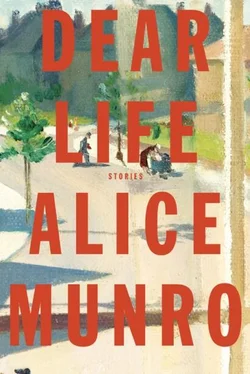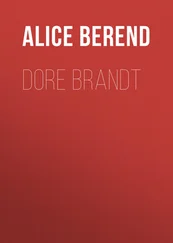In those days, I had to help my father sometimes, because my brother wasn’t old enough yet. I pumped fresh water, and I walked up and down the rows of pens, cleaning out the animals’ drinking tins and refilling them. I enjoyed this. The importance of the work, the frequent solitude were just what I liked. Later on, I had to stay in the house to help my mother, and I was full of resentment and quarrelsome remarks. “Talking back” it was called. I hurt her feelings, she said, and the outcome was that she would go to the barn to tell on me, to my father. Then he’d have to interrupt his work to give me a beating with his belt. (This was not an uncommon punishment at the time.) Afterwards, I’d lie weeping in bed and make plans to run away. But that phase also passed, and in my teens I became manageable, even jolly, noted for my funny recountings of things that I had heard about in town or that had happened at school.
Our house was of a decent size. We didn’t know exactly when it had been built but it had to be less than a century old, because 1858 was the year the first settler had stopped at a place called Bodmin—which had now disappeared—built himself a raft, and come down the river to clear trees from the land that later became a whole village. That early village soon had a sawmill and a hotel and three churches and a school, the same school that was my first, and so dreaded by me. Then a bridge was built across the river, and it began to dawn on people how much more convenient it would be to live over on the other side, on higher ground, and the original settlement dwindled away to the disreputable, and then just peculiar, half-village that I have spoken of.
Our house would not have been one of the very first houses in that early settlement, because it was covered with brick, and they were all just wood, but it had probably gone up not long afterwards. It turned its back on the village; it faced west across slightly downsloping fields to the hidden curve where the river made what was called the Big Bend. Beyond the river was a patch of dark evergreen trees, probably cedar but too far away to tell. And even farther away, on another hillside, was another house, quite small at that distance, facing ours, that we would never visit or know and that was to me like a dwarf’s house in a story. But we knew the name of the man who lived there, or had lived there at one time, for he might have died by now. Roly Grain, his name was, and he does not have any further part in what I’m writing now, in spite of his troll’s name, because this is not a story, only life.
My mother had two miscarriages before she had me, so when I was born, in 1931, there must have been some satisfaction. But the times were getting less and less promising. The truth was that my father had got into the fur business just a little too late. The success he’d hoped for would have been more likely back in the mid-twenties, when furs were newly popular and people had money. But he had not got started then. Still, we survived, right up to and through the war, and even at the end of the war there must have been an encouraging flurry, because that was the summer my father fixed up the house, adding a layer of brown paint over the traditional redbrick. There was some problem with the way the bricks and boards were fitted; they did not keep out the cold as well as they were supposed to. It was thought that the coat of paint would help, though I can’t recall that it ever did. Also, we got a bathroom, and the unused dumbwaiter became kitchen cupboards, and the big dining room with the open stairway changed into a regular room with enclosed stairs. That change comforted me in some unexamined way, because my father’s beatings of me had taken place in the old room, with me wanting to die for the misery and shame of it all. Now the difference in the setting made it hard even to imagine such a thing happening. I was in high school and doing better every year, as activities like hemstitching and writing with a straight pen were left behind, and social studies became history and you could learn Latin.
After the optimism of that season of redecoration, however, our business dried up again, and this time it never came back. My father pelted all the foxes, then the mink, and got what shockingly little money he could for them, then he worked by day pulling down the sheds where that enterprise had been born and had died, before heading off to take the five-o’clock watch in the foundry. He would not come home until around midnight.
As soon as I got home from school, I went to work making my father’s lunch. I fried two slices of cottage roll and put lots of ketchup on them. I filled his thermos with strong black tea. I put in a bran muffin with jam on it, or perhaps a heavy piece of homemade pie. Sometimes on Saturdays I made a pie, and sometimes my mother did, though her baking was getting to be unreliable.
Something had come upon us that was even more unexpected and would become more devastating than the loss of income, though we didn’t know it yet. It was the early onset of Parkinson’s disease, which showed up when my mother was in her forties.
At first, it was not too bad. Her eyes only rarely turned up into her head in a wandering way, and the soft down from an oversupply of saliva was just visible around her lips. She could get dressed in the mornings with some help, and she was able to do occasional chores around the house. She held on to some strength in herself for a surprisingly long time.
You would think that this was just too much. The business gone, my mother’s health going. It wouldn’t do in fiction. But the strange thing is that I don’t remember that time as unhappy. There wasn’t a particularly despairing mood around the house. Maybe it was not understood then that my mother wouldn’t get any better, only worse. As for my father, he had his strength and would have it for a long time yet. He liked the men he worked with at the foundry, who were, for the most part, men like himself, who’d had some sort of downturn or extra burden added to their lives. He liked the challenging work he did in addition to being the early-night watchman. That work involved pouring molten metal into molds. The foundry made old-fashioned stoves that were sold all over the world. It was a dangerous job, but it was up to you to look out, as my father said. And there was decent pay—a novelty for him.
I believe he was glad to get away, even to do this hard and risky work. To get out of the house and into the company of other men who had their own problems but made the best of things.
Once he was gone, I’d start on supper. I could make things that I thought were exotic, like spaghetti or omelettes, as long as they were cheap. And after the dishes were done—my sister had to dry them, and my brother had to be nagged into throwing the dishwater out over the dark field (I could do that myself but liked giving orders)—I sat down with my feet in the warming oven, which had lost its door, and read the big novels I borrowed from the town library: Independent People , which was about life in Iceland, harder than ours by far, but with a hopeless grandeur to it, or Remembrance of Things Past , which was about nothing I could understand at all but was not on that account to be given up on, or The Magic Mountain , about tuberculosis and containing a great argument between what on one side seemed to be a genial and progressive notion of life and, on the other, a dark and somehow thrilling despair. I never did homework in this precious time, but when exams came I buckled down and stayed up almost all night, cramming my head with whatever I was supposed to know. I had a prodigious short-term memory, and that worked quite well for what was required.
Against several odds, I believed myself a lucky person.
Читать дальше












